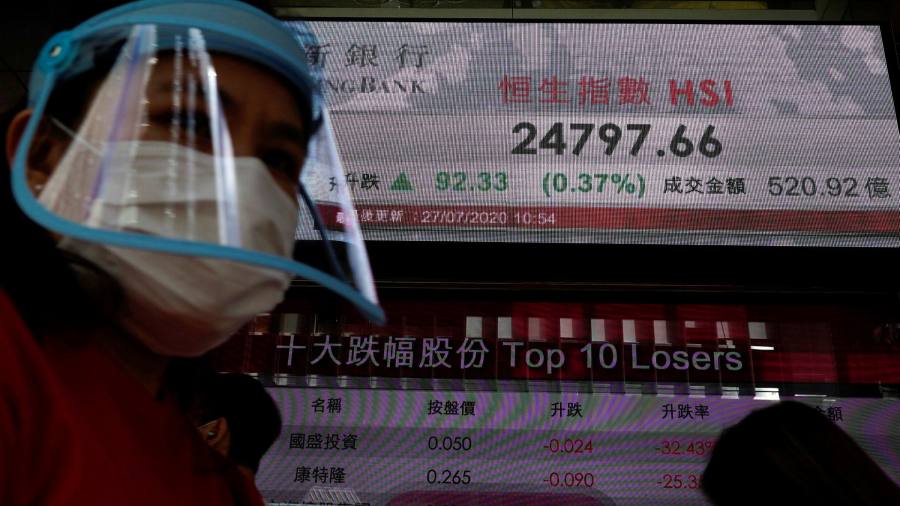[ad_1]
Interested in ETFs?
 Visit the FT’s ETF Hub for news and analysis, investor education and tools to help you select the right ETFs.
A BlackRock China-focused exchange traded fund suffered the heaviest outflows in Hong Kong last year, even as the wider ETF industry in the territory recorded its highest annual inflows in years.
BlackRock’s iShares FTSE A50 China ETF recorded net redemptions of $1.17bn, followed by CSOP Asset Management’s FTSE China A50 ETF, which saw redemptions of $897.8m.
The net outflows were recorded even though China’s A-share market experienced a strong bull run for most of the year and the Hong Kong-domiciled ETF market attracted more than $3bn in net inflows to reach a new high of HK$393bn ($50.7bn). Hong Kong’s ETF industry assets stood at HK$338bn at the end of 2019.
The ETFs have been falling out of favour with investors for some years, although the two vehicles, which remain Hong Kong’s largest ETFs, were among the first to offer investors exposure to China’s onshore equities market.
The iShares FTSE A50 China ETF was listed in 2004 and had more than $14bn assets by the end of 2014. It has experienced large outflows since then and had just $2.64bn in assets on February 22.
The CSOP AM FTSE China A50 ETF was listed in 2012 and quickly grew to $4.86bn in assets by the end of 2014. But it too has suffered large redemptions in every year except one since 2013 and had just $1.89bn on February 22.
However, the two ETFs were not the only China-focused strategies to suffer.
A significant number of Hong Kong-listed ETFs tracking China’s CSI 300 Index also suffered net redemptions. Among the eight CSI 300 ETFs listed in Hong Kong, the ChinaAMC CSI 300 ETF had the heaviest, at $699.1m.
Despite China’s buoyant onshore equities market in the second half of 2020, the outflows suggest the outbreak of coronavirus in China last year and the rocky US-China relationship weighed on sentiment, industry observers said.
Melody He, Hong Kong-based head of sales and product strategy at CSOP AM, said the outflows from its FTSE A50 ETF reflected the fact that many insurance and pension asset owners from markets such as Taiwan were less positive about China A-shares last year.
Investors were withdrawing funds in early 2020 when the pandemic hit China, and while there was a rebound in the middle of last year, the US investment sanctions ordered by President Donald Trump in November made investors more risk averse on the onshore market again, He said.
The CSOP AM FTSE China A50 ETF continued to see outflows in January as many investors were still deciding what China onshore equities products they wanted to invest in as a result of the US investment ban.
The sanctions caused headaches for many passive managers and investors particularly, who have had to decide whether or not to divest from or rejig ETFs that invest in Chinese companies that the Pentagon identified as being linked to the Chinese military.
Many of these Chinese companies are listed in major exchanges including Hong Kong, China and the US, and have a broad range of foreign investors, including BlackRock, Vanguard and State Street Global Advisors.
The outflows from Hong Kong’s two largest and oldest ETFs also reflect the fact that investors now have many more available routes to invest in China’s onshore equities market and more are choosing active strategies to hone in on growth industries.
When the iShares FTSE A50 ETF was first launched in 2004, it was one of few tools investors had to access China’s onshore market — especially as the launch was prior to the establishment of the qualified foreign institutional investor and renminbi qualified foreign institutional investor investment schemes.
However, global investors are reducing their exposure to China A-share ETFs, thanks partly to additional investment avenues such as the stock connect programme, and are taking a more “active investment approachâ€, according to a BlackRock spokesperson.
The iShares FTSE A50 ETF was also affected by investors realising profits from the equities market rally approaching the Chinese new year in mid-February, the spokesperson added.
The iShares FTSE A50 China ETF has observed annual outflows in seven out of the 10 years since 2011, data from Morningstar Direct show. The biggest outflow took place in 2015, when China’s onshore market declined sharply, when the vehicle suffered net redemptions of $6.83bn.
BlackRock also said that while investors were reducing their exposures to China A-share ETFs, some of them were “investing heavily†in China’s technology sector. Its iShares Hang Seng Tech ETF had over $800m in assets under management as of the third week of February.
However, a Hong Kong-based senior executive with a foreign ETF issuer in the territory, warned that thematic ETFs, such as the tech ETF, were likely to suffer from big swings in inflows and outflows as investors chased a new theme and abandoned old ones.
In August, some retail investors suffered huge losses due to the extreme price swings during the initial launch of the CSOP Hang Seng Tech Index ETF, which achieved a record daily turnover of HK$3bn on its first day of trading.
*Ignites Asia is a news service published by FT Specialist for professionals working in the asset management industry. It covers everything from new product launches to regulations and industry trends. Trials and subscriptions are available at ignitesasia.com.

Click here to visit the ETF Hub
[ad_2]
Source link






